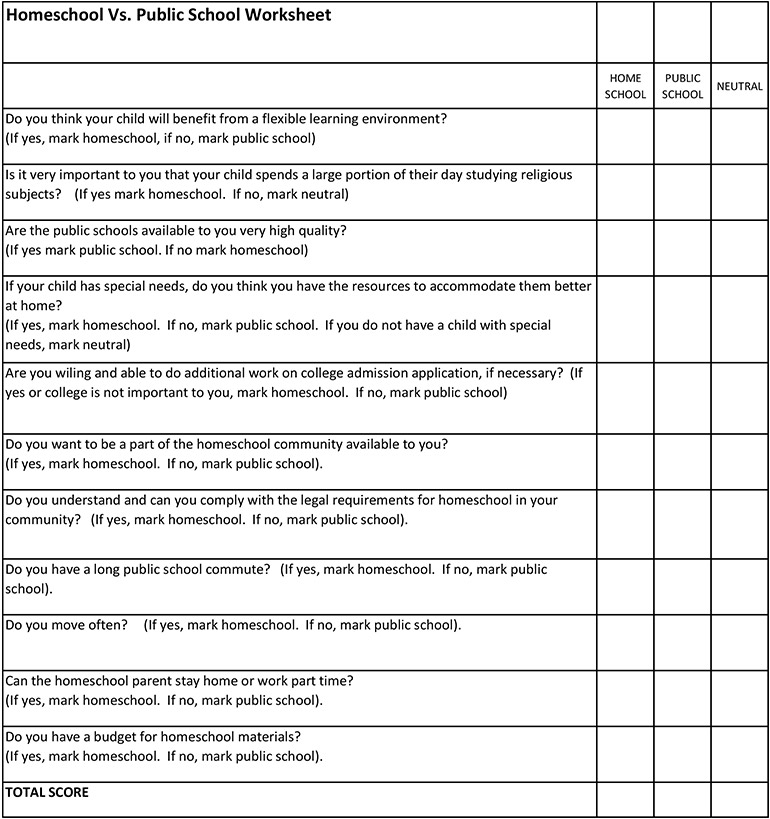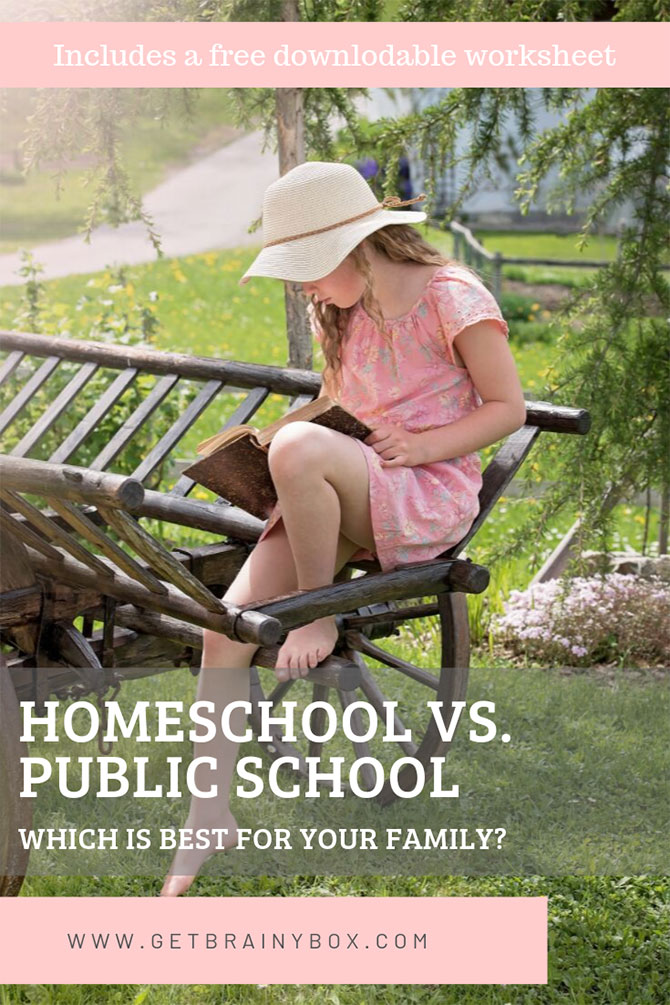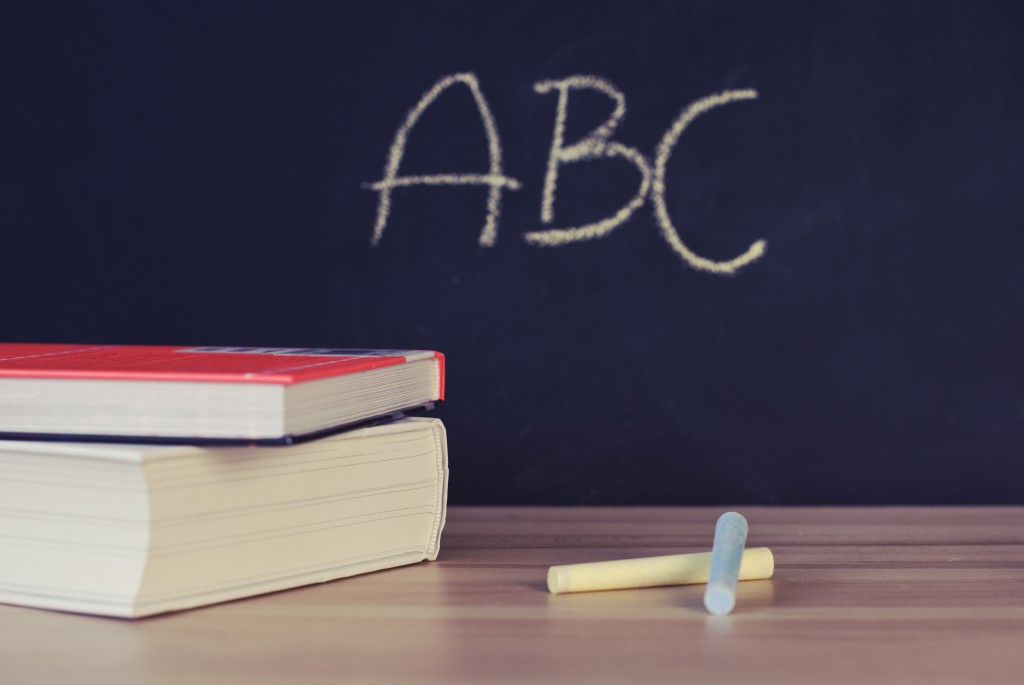Have you ever asked: “what are the pros and cons of homeschool vs. public school?” Although there are many opinions online, not all of them are objective. Often, a homeschooler is going to focus on the advantages of homeschooling. And a public school parent will usually tell you to send your kids to public school! However, there are two sides to every coin and there is no one “right” way to educate. As someone who’s had kids in both homeschool and public school, I know that neither is perfect. However, one of them is probably better for your specific situation. Today, I’d like to give you some objective reasons for both homeschool and public school. In the end, whether you chose one or the other, I hope to make the decision a bit easier.
At the bottom of this article, I attach a downloadable worksheet – print it and fill it out to help make your decision.

Flexible (Homeschool) or Structured (Public School)?
One of the most important reasons why many parents chose to homeschool is the ability to create a flexible learning program. This program can be based on the child’s interest. In a school environment, everyone must cover the same program. In a homeschool, children can go at their own pace and focus on their interests. One child may focus on science, while another one on reading. So the first question you will need to ask yourself, is: do you want your child to focus on specific subjects? Or do you prefer a broad education, and ensuring your child is not missing any important subjects? A child who goes to public school may know a little bit about many things. But a child who goes to homeschool might have a chance to focus on some subjects more.
Also See: Life in Space PDF Kit
Religious Beliefs vs. Mostly Secular Education
A very important reason for many parents who chose to homeschool is to pass their belief system on to their children. This doesn’t mean you can’t pass on your faith if a child goes to a public school, of course. Many parents do, utilizing afterschool homestudy and weekend classes. And there are full-time private schools that focus on religion. However, if your belief system is very important and no private school option is available, this gives you another reason to homeschool.
But keep in mind being secular does not mean you must send your child to public school. Rather, being secular is neutral and probably won’t influence your decision between public school vs. homeschool. Today many secular parents choose to homeschool their kids. And helpfully, there are a lot of secular homeschooler communities in the United States.
The Quality Question: Public School Vs. Homeschool
A big reason many of my friends chose to homeschool is the quality of public school education. Depending on where you live, this could be a huge factor. Some schools are underfunded, teachers are underpaid and overworked. Some classes are very crowded! If you feel your child won’t benefit from public school education, this is a great reason to homeschool.
On the other hand, another important factor to keep in mind is the quality of the homeschool you can create. Homeschooling is like having a full-time job while you already have three other jobs. Planning and researching materials is time-consuming. But if you love to learn, research, and have the patience to teach, you may be able to provide an excellent homeschool environment. The question here is a simple one: Do you think you can provide an education that is better than the education in public school?

Who Will Better Accommodate Your Child’s Special Needs?
This is a hard one for many parents. If you have a child with special needs, they may benefit from the homeschool environment, depending on your circumstances. On the one hand, nobody understands your child better than you. You are aware of their unique needs, and the best environment for them. On the other hand, a public school may be able to provide a trained therapist who will also work with your child. Additionally, you may be simply in need of a break for a few hours a day. This is nothing to feel guilty about – parents often need a break, but parents of special needs kids may need one more often.
Sometimes, parents of kids with special needs chose to homeschool out of obligation. I don’t think this the right way to make a decision. Instead, try to consider the situation objectively. Homeschooling may bring you closer to your child and help them in the long run. But if you are already near your breaking point, you will both be more frustrated – and your child will not benefit. This is a hard choice, and one only you can make. In general, however, many children with special needs will benefit from the personal homeschool environment.
Homeschool Vs. Public School: Nontraditional or College Path?
This is one that recently came up in my discussion with another homeschooler. Do you believe college is a necessity? My own opinion is that it is necessary in today’s world. But my friend disagreed. She felt that because her daughter had already become self-directed and independent in the homeschool environment, college wasn’t necessary. Many people who chose to homeschool feel this way. Some even prefer a non-college bound path for their children. And many homeschoolers are open to the possibilities and aren’t committed one way or the other.
Public school parents, on the other hand, are often committed to college from an early age. They often feel it is necessary, and assume their child will get at least an undergraduate degree.
Of course, homeschoolers can and do go to college. In fact, it seems like every few weeks an overachieving homeschooler makes the news – Harvard at 15. There is nothing to prevent your homeschooled child from going to college. However, the process of college admission for homeschoolers can be harder to navigate than for public school students. One more factor to keep in mind when deciding on homeschool vs. public school.
The Community: Homeschool Vs. Public School
This one really depends on where you live. In some places, the homeschool community is thriving. Your social calendar will be jam-packed with events – and you’ll never feel alone. In other places, homeschooling can get very lonely. Public schools come with a community pre-build – you may or may not like it, but it’s there. Humans are social creatures and need a community. So before you make a decision, I suggest you get acquainted with the homeschool community in your area. Don’t just seek out a facebook group. Go to a meeting or an event with your children. If you and your children want to be a part of this community, this is a big plus. Homeschooling with support is much easier than homeschooling alone.

Understand the Laws
Depending on where you live, laws and paperwork required for homeschoolers can range from intense to almost none at all. Before you set out on a homeschooling journey, make sure to understand the legal requirements. The easiest way to find out what you’ll need is to talk to members of your community. Additionally, call your state education board for a list of documents you’ll need. Make sure you understand (and are willing to abide by) all the homeschool laws in your state and city. Keep in mind that large cities often have more strict conditions than the states they are located in. For instance, New York City and Philadelphia have very strict homeschool laws.
However, do not let the laws deter you. An experienced homeschooler in New York City might take a few hours a year to file the paperwork. Therefore, this is probably not a major factor, but one to keep in mind.
Consider your commute and how often you move
Whether you live in a big urban center, or in the country, your child has to commute to school. For some, it might be just a walk across the street. For others, it’s an hour-long bus commute. Your child’s time, like yours, is valuable. Just like working from home, homeschooling saves valuable hours that can be used for learning. Will you save a lot of time if you chose to homeschool? If so, this is a big benefit to keep in mind. On the other hand, your commute may only be a few minutes. In that case, commute time is not a major “pro homeschool” factor.
Do you move a lot? Many families who move often chose to homeschool. After all, if you are constantly being reassigned, homeschooling will keep your child’s learning environment stable. The more often you move, the more advantages to homeschooling. This is why so many military families chose to homeschool.

Can you afford to homeschool?
This is a key question for many families. With homeschooling, your child can receive a private school education inexpensively. However, some investment is necessary. But more than just homeschool materials, the biggest investment is the loss of income from one parent. After all, most homeschooling parents either don’t work or only work part-time.
Before you make the decision on homeschool vs. public school, consider the expense of staying home and the expense of homeschool materials. Some states, like California, help homeschoolers with the material budget. A homeschooler can enroll in a specially created charter school, and get several thousand dollars a year for expenses. Additionally, with research you’ll find that many materials are free or inexpensive.
Of course, in many families, the homeschool parent may already be staying home, so this is not a new expense. Overall, homeschool will almost always be more expensive than public school but much cheaper than private school. Therefore, finances are an important factor to consider before you make your decision.
Homeschool Vs. Public School Worksheet
To help you make the decision, I created a downloadable worksheet. Go through it at your own pace as you decide on the right education for your family.

Conclusion
Picking between homeschool vs. public school is a deeply personal choice. There is no one “right way” to educate your children. However, one decision will be best for your family. I hope you will find this article to be both objective and useful resource on your homeschool journey.








